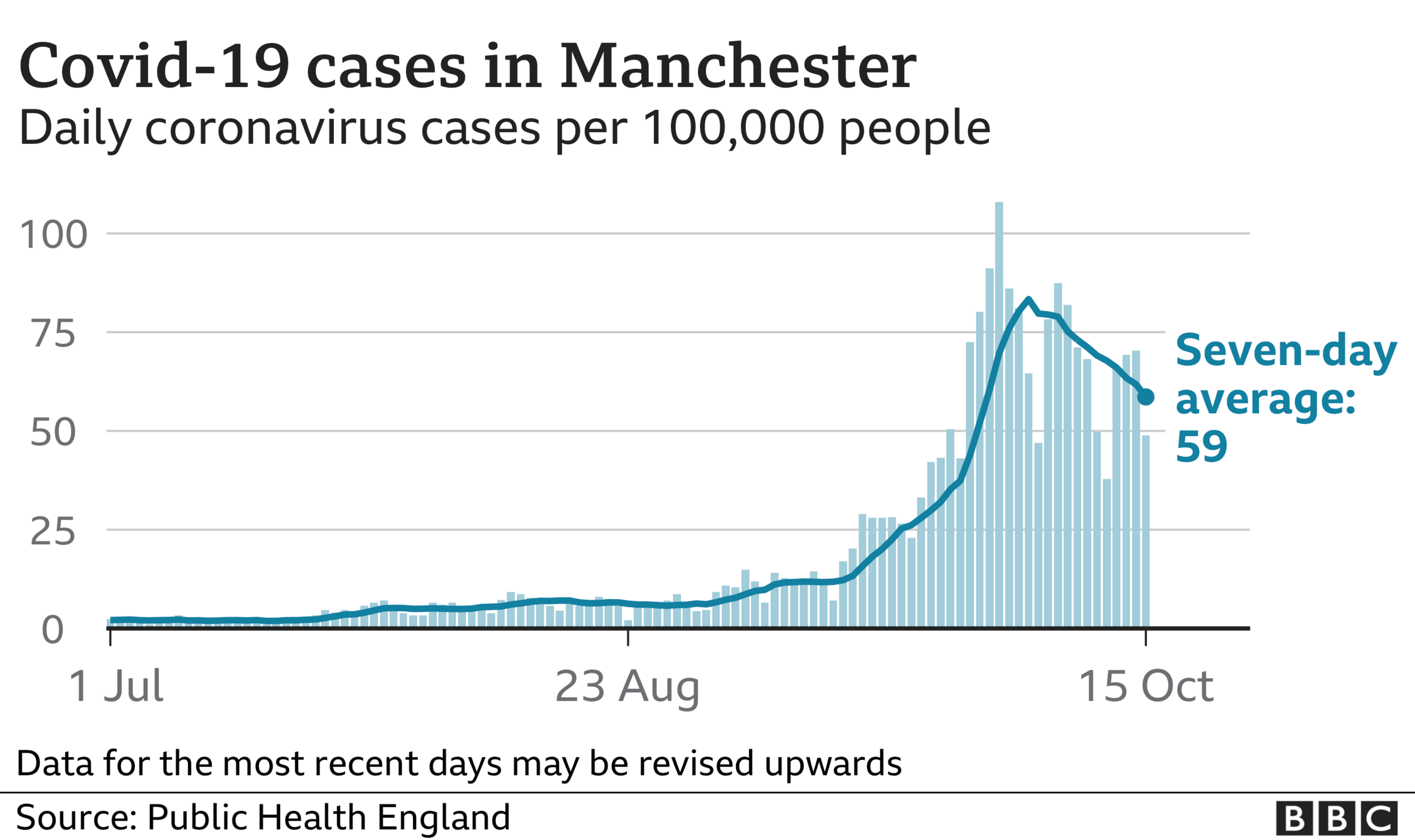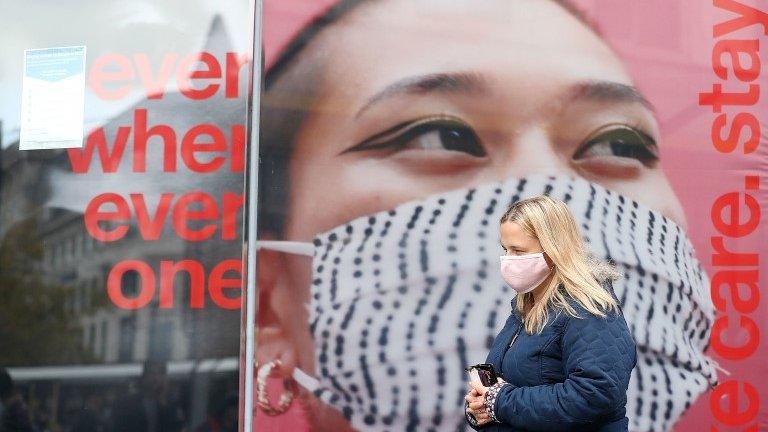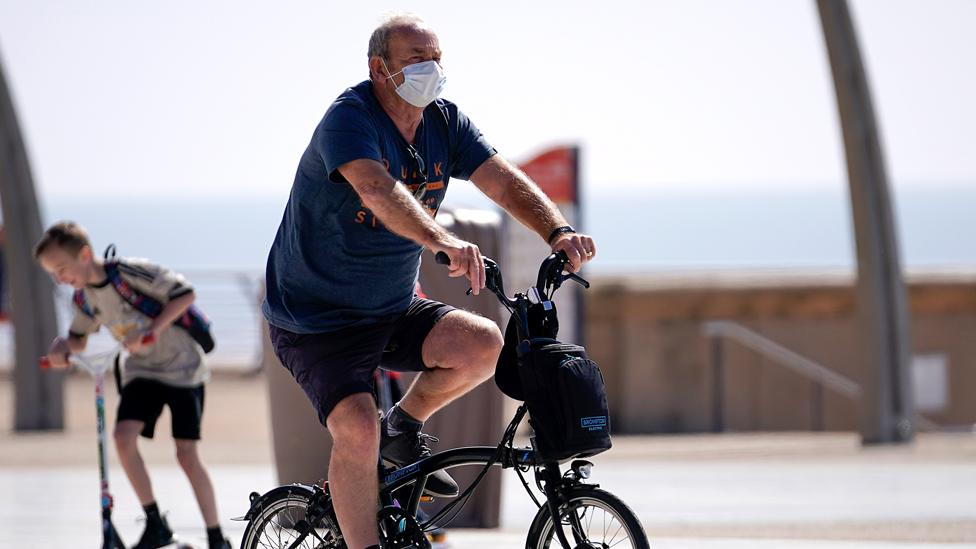Covid: Greater Manchester restrictions delay 'puts lives at risk'
- Published

Local leaders say more financial support is needed for Greater Manchester's businesses if tighter restrictions are to be imposed
Further delays to a decision on Greater Manchester's Covid restrictions will "put people's lives at risk", the communities secretary has said.
Robert Jenrick said he hoped he could reach an agreement with the region's MPs "in the next day or two".
Local leaders want better financial support before agreeing to a move to the top tier of rules, which would force some businesses to close.
Talks are continuing after a weekend of discussions.
Mr Jenrick indicated that Greater Manchester could be offered a financial package similar to the "tens of millions" of pounds of support agreed for Lancashire and the Liverpool City Region - the two parts of England already in tier three.
A key sticking point of the dispute is that Greater Manchester Mayor Andy Burnham wants the government to reintroduce the 80% furlough scheme used during the UK's first lockdown, instead of the new Job Support Scheme which covers 67% of the wages of people affected by tier three closures.
Mr Burnham said businesses that would be closed under the highest level of coronavirus restrictions - including pubs, bookmakers and gyms - "are places where people are on low wages" and that two-thirds pay is not enough.
But Mr Jenrick told BBC Breakfast the Manchester talks had gone on "too long" as coronavirus case numbers remain "seriously high".
"Delay I'm afraid will only make the situation worse, will only put people's lives at risk, and will only make the economic fallout for the city worse in the long term," he added.
"We do now need to take action. I hope that we can reach agreement but one way or another, we need to draw this to a conclusion."
Prime Minister Boris Johnson said on Friday that he might "need to intervene" if local leaders did not accept a move to tier three.
Meanwhile, people in Wales will be told from Friday to stay at home, and pubs, restaurants and non-essential shops will shut, as part of a "short, sharp" national lockdown until 9 November.
It comes as a two-week school closure begins in Northern Ireland as part of a tightening of restrictions to curb the spread of the virus.
Scotland continues to draw up plans for a three-tier framework of restrictions, similar to England's, to account for regional differences in Covid rates and isolate areas of higher prevalence.
On Monday the UK recorded a further 18,804 coronavirus cases and 80 deaths within 28 days of a positive test.
Mayor will not 'roll over' for money
BBC deputy political editor Vicki Young said Treasury sources insisted Greater Manchester would not get a more generous offer on wages than the Job Support Scheme provides, but pointed to other financial support packages agreed with tier three areas.
On Sunday, Liverpool City Region's metro mayor Steve Rotheram said his area would receive an additional £44m, external and a similar package worth £42m was given to local leaders in Lancashire last week.


Mr Burnham said he had a "constructive call" with the PM's team on Sunday, but on Monday morning he told Sky News: "I'm not going to roll over at the sight of a cheque."
Nottingham's Labour council leader David Mellen has also called for more support for businesses in the city if it is moved to tier three.
However, the Labour leader of Manchester City Council, Sir Richard Leese, said the row was not just about money and questioned the effectiveness of "blanket" business closures, instead suggesting a shielding programme for those most at risk from Covid-19.
And mayors and council leaders in the Liverpool City Region have written to the prime minister asking for an "immediate review" of the decision to close gyms and leisure centres in the area as part of tier three measures, pointing out that in Lancashire, which is also in tier three, they have not been required to close.
They are calling on the government to provide the scientific evidence supporting the move and if they are unable to do so, allow them to reopen.

How much could Greater Manchester get?

When an area goes in to tier three - the "very high alert" category - this unlocks enhanced financial support from the government.
In the Liverpool City Region, some of the funds will be used both to bolster contact tracing, to enhance compliance, and to support people who are clinically extremely vulnerable.
This is worth £14m - and a similar package in Lancashire is worth £12m. But following negotiations, both areas have also been given a further £30m in "business support".
Whitehall sources have told the BBC that Greater Manchester would be offered no less generous terms than Lancashire or Liverpool.
On a per capita basis, that could mean potentially £70-80m being made available from central government, in return for enhanced restrictions.
Talks are also under way between the government and local authority leaders in South Yorkshire.
Council leaders want a package of support to include more resources for the NHS in the area - and are clear they won't be "bounced" into accepting a move to tier three.

Dr Indeewar Kapila, an intensive care consultant in Greater Manchester, told BBC Radio 4's Today programme that critical care units have capacity at the moment but Manchester's rate - which was 431 cases per 100,000 in the week to 13 October - was "extremely high".
The prime minister's official spokesman said in Greater Manchester the number of new cases in people over the age of 60 had tripled in the most recent 15 days of full data - from 89 cases per 100,000 on 27 September to 282 per 100,000 on 12 October.

The spokesman said all free intensive care capacity could be used by 28 October and could pass the peak seen in the first wave by 2 November, according to the government's pandemic modelling group, SPI-M.
This is based on a "best-case" assumption that the number of intensive care patients would take 14 days to double.
The projections suggest coronavirus patients would take up the entire current intensive care capacity by 8 November and the entire surge capacity by 12 November.
It comes as Greater Manchester MP Yasmin Qureshi, who represents Bolton South East, said she is in hospital with pneumonia two weeks after testing positive for Covid-19.


Hospitals in the North West are incredibly busy, but talk of them being overwhelmed with Covid patients is somewhat premature.
In the spring the number of admissions across the region went from under 100 a day to over 400 in the space of a week.
Cases have been rising much more gradually in recent weeks. In fact there are signs they may have started levelling off at around 200 cases a day.
The hospitals in and around Manchester and Liverpool have borne the brunt of the pressures. Particular concern has been expressed about intensive care, with reports that more than 80% of beds in Manchester are occupied, external.
That is not unusual - last winter similar occupancy rates were seen.
In fact, this is one of the difficulties the NHS faces with Covid - it works so close to capacity in normal times that an extra pressure causes real problems.
But again the local NHS is not yet in the position it was in the spring when it had to take emergency measures to open up extra intensive care beds by cancelling non-Covid work.


WHAT PLANET ARE WE ON: Sir David Attenborough talks about the impact of the pandemic on tackling climate change
IN NEED OF SOME ESCAPISM?: From the world of Doctor Foster comes Life, a brand new drama on BBC iPlayer


How have you been affected by coronavirus? What have restrictions meant for you? Share your experiences by emailing haveyoursay@bbc.co.uk, external.
Please include a contact number if you are willing to speak to a BBC journalist. You can also get in touch in the following ways:
WhatsApp: +44 7756 165803
Tweet: @BBC_HaveYourSay, external
Please read our terms & conditions and privacy policy
If you are reading this page and can't see the form you will need to visit the mobile version of the BBC website to submit your question or comment or you can email us at HaveYourSay@bbc.co.uk, external. Please include your name, age and location with any submission.
- Published18 October 2020

- Published16 October 2020
